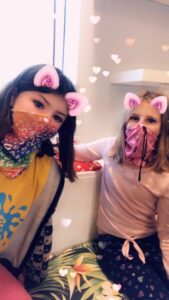The most recent autism statistics estimate that 75-80% of children diagnosed with autism spectrum disorder (ASD) are boys. Because it seems like there are so many more boys with ASD than girls, many autism interventions for children are designed with boys in mind. Unfortunately for the nearly 25% of children with ASD who are girls, many of these interventions don’t address key social communication issues that girls experience differently than boys. That’s where the Girls Only! Social Group at the Thompson Center hopes to make a difference.

“Girls with ASD face extraordinary challenges, especially during their middle school years,” said Michelle Dampf, a speech-language pathologist at the Thompson Center. “The Girls Only! Social Group offers girls with ASD the opportunity to learn the social skills needed to successfully engage in social situations leading to independence and employability later on in life.”
The Girls Only! Social Group targets several skills during its 12 week-long program, including social skills related to body language and gestures, as well as conversational skills. Dampf, who coordinates the group, also works on social problem solving, empathy, self-care and personal care skills with the girls as well. These skills are taught through various evidence-based methods such as video modeling, role-plays, social narratives and visual supports.

“Typically, pre-teen and teen girls learn the necessary social nuances through observation, social interactions, and various life events,” Dampf said. “Girls with ASD tend to miss social cues and do not learn conversational skills, social problem solving, or understand the perspective of others incidentally. Explicit teaching of these skills is needed to facilitate success and overall confidence in social situations and peer engagement.”
The group also offers fun activities and encourages an atmosphere of camaraderie among the participants. One of the favorite parts of the group is when self-advocates visit. Dampf says that when the group participants meet and talk with a young adult who also has ASD, they learn lessons that just cannot be taught unless you have lived with ASD.

“The participants learn that, yes, they have ASD, but that diagnosis does not in any way limit their potential,” Dampf said. “It’s amazing to watch the participants grow in their overall social communication skills and self-confidence.”
The most recent group, which ended in November, took a field trip Papa’s Cat Café in Columbia to close out their successful fall session. The girls all said they thoroughly enjoyed the fun activities that helped them learn the importance of self-care as well as showing empathy for others. While cats were certainly welcomed by the group, one constant remained… NO BOYS ALLOWED!

